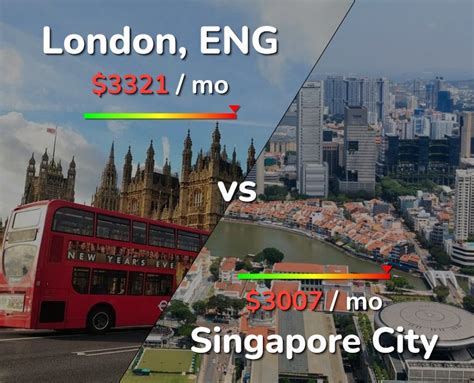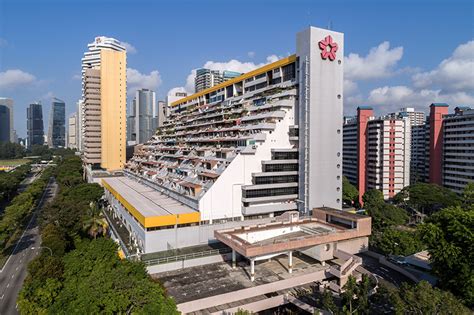

Cost of Living in Singapore vs. London: 2025 Comparison
Introduction
Singapore and London are two global metropolises renowned for their vibrant economies, diverse cultures, and high living standards. However, navigating the cost of living in these cities can be a daunting task, especially for expatriates or those considering relocation. This comprehensive analysis delves into the nuances of living expenses in Singapore and London, providing insights into key factors that influence the overall cost of living. By comparing essential categories such as accommodation, food, transportation, and healthcare, we aim to empower individuals with a clear understanding of the financial implications of living in these cosmopolitan hubs.

Accommodation: Rents and Property Prices
Accommodation constitutes a significant portion of living expenses in both Singapore and London. In Singapore, the property market is highly competitive, with a large proportion of the population residing in public housing. The average monthly rent for a three-bedroom apartment in central Singapore stood at SGD 4,500 (USD 3,250) in 2023, while those in London hover around GBP 2,500 (USD 3,000). However, purchasing property in Singapore is generally more affordable than in London, with the average price for a three-bedroom apartment in the city center being SGD 1.2 million (USD 870,000) compared to GBP 500,000 (USD 600,000) in London.
Food: Groceries and Dining Out
The cost of groceries varies significantly between the two cities. Numbeo, a cost of living database, estimates that a monthly grocery basket for a single person in Singapore costs around SGD 350 (USD 250), while in London it is approximately GBP 220 (USD 270). Dining out can also be more expensive in London, with the average cost of a meal at a mid-range restaurant being GBP 20 (USD 25) compared to SGD 25 (USD 18) in Singapore.
Transportation: Public and Private
Getting around Singapore is relatively affordable, thanks to its efficient public transportation system. A monthly pass for unlimited bus and train travel costs around SGD 120 (USD 87), while in London, a monthly travelcard for all zones is approximately GBP 150 (USD 180). However, private vehicle ownership can be more expensive in Singapore due to high car prices and stringent taxes, with a Toyota Camry costing around SGD 150,000 (USD 110,000) compared to GBP 30,000 (USD 36,000) in London.
Healthcare: Public and Private
Healthcare costs can be substantial, especially for those relying on private medical insurance. In Singapore, the public healthcare system is highly subsidized, with citizens and permanent residents enjoying subsidized medical care. Private healthcare costs vary depending on the provider and type of treatment, but are generally lower than in London. For instance, the cost of a doctor’s consultation is around SGD 50 (USD 36) in Singapore compared to GBP 90 (USD 110) in London.
Effective Strategies for Managing Living Expenses
Navigating the cost of living in Singapore or London requires careful planning and budgeting. Here are some effective strategies to minimize expenses:
- Negotiate rent: Be prepared to negotiate with potential landlords to secure a more favorable rent.
- Cook at home: Eating out frequently can be expensive. Cooking meals at home can save a significant amount of money on food.
- Utilize public transportation: Public transportation is often the most affordable way to get around both Singapore and London.
- Take advantage of free activities: Both Singapore and London offer a range of free activities, such as visiting museums, parks, and attending community events.
- Consider shared accommodation: Sharing accommodation with roommates can significantly reduce housing costs, especially in high-demand areas.
Common Mistakes to Avoid
To avoid unnecessary financial burdens, it is essential to steer clear of common mistakes:
- Underestimating accommodation costs: Accommodation expenses can be higher than anticipated, especially in desirable locations.
- Relying solely on taxis: Taxis can be expensive, particularly during peak hours. Public transportation or ride-sharing services are more economical options.
- Neglecting healthcare costs: Healthcare expenses can be substantial, especially for those with pre-existing conditions. Ensure you have adequate health insurance coverage.
- Overindulging in entertainment: Entertainment expenses can add up quickly. Set a budget for entertainment and stick to it.
- Failing to plan ahead: Not planning your expenses in advance can lead to overspending. Create a budget and track expenses regularly.
Reviews: Personal Perspectives on the Cost of Living
“Living in London is undoubtedly expensive, but the city offers a vibrant lifestyle and countless opportunities. The high cost is worth it for the cultural experiences and career advancements,” says Emily, a financial consultant in Canary Wharf.
“Singapore has a high standard of living, but expenses can be challenging for those not earning a high salary. The public housing system is a valuable asset for locals and permanent residents,” states Mark, a software engineer in Bukit Timah.
Market Insights: Future Trends
The cost of living in both Singapore and London is expected to continue rising in the coming years. Factors such as population growth, inflation, and increased demand for housing and transportation are driving up prices.
Recommendations: Enhancing Affordability
To enhance affordability and improve the quality of life for residents, governments can explore the following initiatives:
- Increase supply of affordable housing: Governments can invest in building more affordable housing units to cater to low-income households.
- Subsidize public transportation: Expanding and subsidizing public transportation systems can reduce transportation costs for commuters.
- Provide financial assistance: Governments can offer financial assistance programs to those struggling with living expenses, such as rental assistance or energy subsidies.
- Encourage energy efficiency: Promoting energy-efficient practices and renewable energy sources can reduce energy costs for households.
- Foster financial literacy: Educating residents on financial management and budgeting can help them make informed decisions and avoid financial pitfalls.
Conclusion
Comparing the cost of living in Singapore and London reveals their unique characteristics and financial challenges. Singapore offers a high standard of living with a competitive property market, while London provides a vibrant lifestyle with a high cost of accommodation and transportation. By understanding the nuances of living expenses in these cities, individuals can make informed decisions about their relocation and adopt effective strategies to manage their finances. Regular monitoring of market trends and proactive government initiatives are essential to ensure a sustainable and affordable living environment for all.










